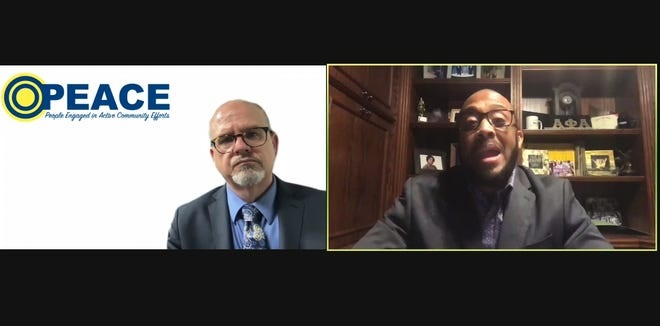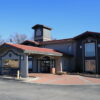By Hannah Morse, Palm Beach Post
The coronavirus pandemic may have kept a local justice ministry from hosting its annual action summit in person this year, but their passion for righting the wrongs in Palm Beach County was not lost through the airwaves.
Nearly 1,400 people virtually attended on Monday the Nehemiah Action Assembly hosted by People Engaged in Active Community Efforts, or PEACE, a collection of 20 congregations who push elected officials on local justice reforms.
Instead of the exuberant cheers that would fill an auditorium, attendees were asked to use the clapping hands emoji to show their support on the Zoom meeting. Rather than the boisterous call-and-response of “we are peace, we are neighbors,” attendees flooded the chatroom with the words.
The requests PEACE leaders made weren’t new. They asked whether county commissioners would support giving a $75,000 grant to the Legal Aid Society of Palm Beach County to sponsor 5,500 more community IDs, and if Palm Beach County Sheriff Ric Bradshaw could commit to analyzing traffic stop data to learn of any potential racial profiling.
The ask for more community IDs comes at a crucial moment, when people who cannot prove their Florida residency, either by state-issued identification or other documents, may be denied access to the coronavirus vaccine.
“Why do we classify the immigrant community as essential to pick our vegetables, put food on our tables, but don’t deem them essential enough to have a community ID?” said the Rev. Nestor Rodriguez of St. Ann Catholic Church in West Palm Beach.
One woman gave video testimony about how the community ID has helped her.
“Before — at the doctor, the pharmacy, at my child’s school, at the clinic — when people asked me for identification, I would present them the registration from my home country of Mexico. But it wouldn’t be taken,” said the woman, a parishioner of a church in Pahokee.
The community ID has been accepted at all of those places, she said. But she’s concerned that her ID won’t be renewed and worried about the program’s future.
“We’re all made in God’s image, but there are tens of thousands of people in our community who are treated as outsiders even though they’ve lived here, raised families here and deemed essential workers during a pandemic,” said the Rev. Raul Cardenas of St. Mary’s Catholic Church of Pahokee through an interpreter. “The undocumented community, homeless, elderly, even those recently released from jail are kept in the shadow and told they don’t matter.”
Three of seven Palm Beach County commissioners — Mack Bernard, Gregg Weiss and Melissa McKinlay — indicated they would support a county grant.
“In light of the ID requirement for vaccines imposed by the governor, it is a matter of public health in my opinion,” McKinlay said.
County Mayor Dave Kerner and Commissioners Maria Marino and Maria Sachs did not attend the assembly.
Vice Mayor Robert Weinroth opposed community IDs, saying the state’s offering was sufficient.
“If they are unable to bring forward the documentation that would be satisfactory, I would have a real problem with those people getting the ID, which could be used for identity theft,” Weinroth said.
Vanessa Coe, the supervising attorney for Legal Aid’s community ID program, said the organization has issued 3,000 IDs without any instance of fraud. Municipalities like Lake Worth Beach and Belle Glade recognize the IDs, too.
PEACE leaders asked the county for this grant to Legal Aid in 2017. While the Criminal Justice Commission supported the idea, Bradshaw opposed it and county commissioners followed. But in February 2019, West Palm Beach city commissioners gave a $20,000 grant to Legal Aid to kick off the program.
While Bradshaw could not attend the assembly, he provided his response in a video. He said he could not commit to completing his research on community IDs within 60 days, which PEACE leaders had asked of him. Bradshaw wanted to first understand best practices across the country.
“I want it to be acceptable to all the police departments in the county, and I think when we get the ID to where it’s acceptable that we’ll get buy-in,” he said.
He said he would agree to collect and analyze traffic stop data and work with Northeastern University professor Jack McDevitt for the benefit of “the community and us to make sure that we’re in compliance with everything that we need to be in compliance with, that we’re not involved in any type of profiling.”
A similar request was made of police chiefs by PEACE leaders in 2019, but representatives from West Palm Beach and Boynton Beach police departments made no firm commitments.
The Rev. Dr. Jovan Davis of St. John Missionary Baptist Church said he understood the “all too real” fear of being in the community without identification, being stopped at random. He shared an anecdote from a few years ago about when he accidentally left his wallet behind at a church meeting.
“Immediately, anxiety, fear and a sense of nervousness overpowered my entire body as thoughts of what could possibly happen to me if the police stopped me flooded my mind,” he said. “I knew that being young, being black and driving a car without a license would not lend me the grace of being given the benefit of the doubt.”
He has been stopped by police before, Davis said, “for no legitimate reason.”
Davis called his wife in case something were to happen and prayed on the rest of the drive home.
“I don’t want to live like this. I don’t want to live in fear in a country where I’m supposed to be free. And I certainly don’t want my children living like that,” he said.
View the original story here.






